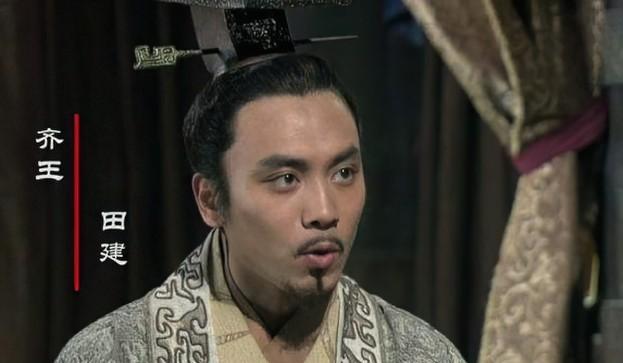In 221 BC, the Qin army entered Linzi City without bloodshed, and Wang Jian of Qi was starved to death, and the Tian Qi regime, which was founded in 165 years, collapsed. Although at the end of the Qin Dynasty and the beginning of the Han Dynasty, the royal nobles of the State of Qi once realized the ideal of restoration, but they were eventually destroyed by Liu Bang. However, Liu Bang would never have thought that the Western Han Dynasty regime he had single-handedly created would be ended by the descendants of King Qi! So, what's going on here?
The matter has to start with Wang Jian of Qi, the last monarch of the State of Qi, and although he was starved to death, his descendants still exist, but they have been reduced to commoners. Among the many grandsons of Qi Wangjian, there was a man named Tian An, who also participated in the anti-Qin uprising in the last years of the Qin Dynasty. When Xiang Yu launched the Battle of Julu, Tian An led an army to capture several cities in Northern Ji, and then led his army to annex Xiang Yu. Later, Xiang Yu led a large army into Xianyang and divided the meritorious people, of which Tian An was made the King of Jibei.

Xiang Yu divided the kings, which caused the dissatisfaction of the Qi nobleman Tian Rong, who did not lead his army into the pass, so he did not get the title. Tian Rong, enraged, rebelled and killed Qi Wang Tian Shi first, and then Killed Jibei Wang Tian An. Later, Tian Heng became the King of Qi again, but was eventually destroyed by Liu Bang. After that, Liu Bang first sealed Han Xin, and then made his eldest son Liu Fei the King of Qi, and the Tian family completely lost the throne. However, the local people of the State of Qi still called the Tian family "Wang Family", so Tian An's descendants changed their surname to Wang.
Tian An's grandson was named Wang Sui, and Wang Sui's son was named Wang He, who served as an embroidered imperial historian during the reign of Emperor Wu of the Han Dynasty, but was dismissed from office because he refused to kill innocents indiscriminately when he arrested bandits. Wang He also had a vendetta against the Dongping Ling clan, so he moved his family to Suli, the Yuancheng County Party Committee of Wei County. Wang He was very prestigious in the local area and was elected as the Third Elder. Wang He's son, named Wang Ban, studied the law in Chang'an and served as a court lieutenant.
Wang Ban had two major hobbies, one was fine wine and the other was a beautiful woman, so he married many wives and concubines and gave birth to four women and eight men. Wang Ban's sons were all mediocre, so he turned his attention to his daughter and tried his best to train his second daughter, Wang Zhengjun, to "teach and learn the drum and piano." In 54 AD, Wang Ban sent his daughter Wang Zhengjun to the palace, but he did not get the opportunity for more than a year. Later, Emperor Xuan of Han selected five women for the crown prince to choose, and the prince chose Wang Zhengjun with a finger.
In fact, at that time, the crown prince's favorite concubine had just died of illness, and he did not look at anyone, because he did not dare to go against the will of his father and emperor, so he chose it casually. Later, Wang Zhengjun "had a lucky body" and gave birth to a boy. Emperor Xuan of Han was overjoyed and named this grandson Liu Xiao (劉骜), the character Taisun (太孙). After Emperor Yuan of Han succeeded to the throne, Wang Zhengjun was made empress, and the Wang family began to enter the political arena. In 33 BC, Liu Xiao succeeded to the throne, that is, Emperor Cheng of Han, and Wang Zhengjun's brother Wang Feng served as the Grand Sima (大司馬), the Great General, and the Consul Shangshu (司書事), and began to control the Western Han Dynasty.
The Wang family became the first magnate at that time, "The father and brothers of the Yuan Dynasty were all enfeoffed with the titles of Yuan and Chengshi, and they held the position of auxiliary government, and the Ninth Marquis of the Family and the Five Great Simas" were all princes. In 8 BC, Wang Zhengjun's nephew Wang Mang was appointed Grand Sima at the age of Chinese New Year's Eve eight. Wang Mang was a man who was very good at shaping his own image, and after he came to power, he "hired zhu xianliang to make history, rewarded Yi qian to enjoy the soldiers, and became more and more frugal", so his reputation was very good.
However, it turned out that Wang Mang was ambitious. In 6 AD, emperor Ping of Han was poisoned, and Wang Mang, who called himself a "false emperor", exercised the authority of the emperor, and made Liu Bao the crown prince. Three years later, Wang Mang officially claimed the title of emperor and changed the name of the country to Xin, which was called Xinmang in history. More than two hundred years after the fall of the State of Qi, as a descendant of the royal family of the State of Qi, Wang Mang became the lord of the world. However, due to the failure of Wang Mang's reform, the world was in chaos, and in 23 AD, Wang Mang was killed and the Han Dynasty was revived.
References: 1. Book of Han; 2. Zizhi Tongjian